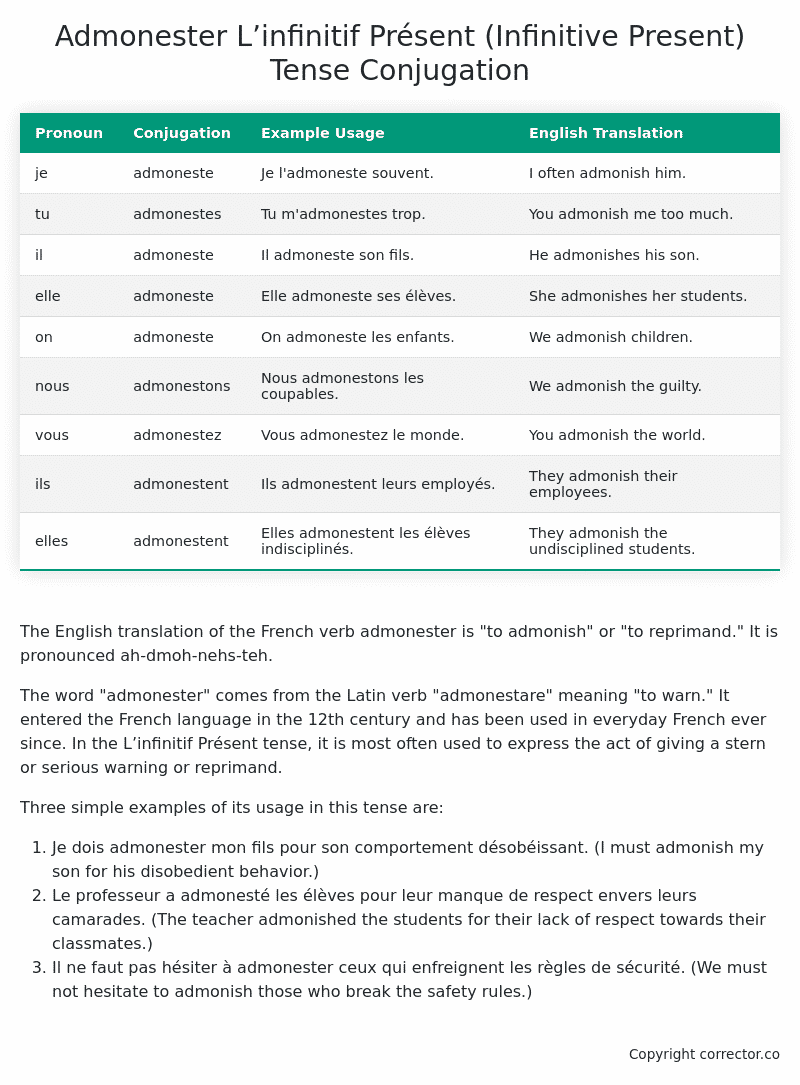L’infinitif Présent (Infinitive Present) Tense Conjugation of the French Verb admonester
Introduction to the verb admonester
The English translation of the French verb admonester is “to admonish” or “to reprimand.” It is pronounced ah-dmoh-nehs-teh.
The word “admonester” comes from the Latin verb “admonestare” meaning “to warn.” It entered the French language in the 12th century and has been used in everyday French ever since. In the L’infinitif Présent tense, it is most often used to express the act of giving a stern or serious warning or reprimand.
Three simple examples of its usage in this tense are:
- Je dois admonester mon fils pour son comportement désobéissant. (I must admonish my son for his disobedient behavior.)
- Le professeur a admonesté les élèves pour leur manque de respect envers leurs camarades. (The teacher admonished the students for their lack of respect towards their classmates.)
- Il ne faut pas hésiter à admonester ceux qui enfreignent les règles de sécurité. (We must not hesitate to admonish those who break the safety rules.)
Table of the L’infinitif Présent (Infinitive Present) Tense Conjugation of admonester
| Pronoun | Conjugation | Example Usage | English Translation |
|---|---|---|---|
| je | admoneste | Je l’admoneste souvent. | I often admonish him. |
| tu | admonestes | Tu m’admonestes trop. | You admonish me too much. |
| il | admoneste | Il admoneste son fils. | He admonishes his son. |
| elle | admoneste | Elle admoneste ses élèves. | She admonishes her students. |
| on | admoneste | On admoneste les enfants. | We admonish children. |
| nous | admonestons | Nous admonestons les coupables. | We admonish the guilty. |
| vous | admonestez | Vous admonestez le monde. | You admonish the world. |
| ils | admonestent | Ils admonestent leurs employés. | They admonish their employees. |
| elles | admonestent | Elles admonestent les élèves indisciplinés. | They admonish the undisciplined students. |
Other Conjugations for Admonester.
Le Present (Present Tense) Conjugation of the French Verb admonester
Imparfait (Imperfect) Tense Conjugation of the French Verb admonester
Passé Simple (Simple Past) Tense Conjugation of the French Verb admonester
Passé Composé (Present Perfect) Tense Conjugation of the French Verb admonester
Futur Simple (Simple Future) Tense Conjugation of the French Verb admonester
Futur Proche (Near Future) Tense Conjugation of the French Verb admonester
Plus-que-parfait (Pluperfect) Tense Conjugation of the French Verb admonester
Passé Antérieur (Past Anterior) Tense Conjugation of the French Verb admonester
Futur Antérieur (Future Anterior) Tense Conjugation of the French Verb admonester
Subjonctif Présent (Subjunctive Present) Tense Conjugation of the French Verb admonester
Subjonctif Passé (Subjunctive Past) Tense Conjugation of the French Verb admonester
Subjonctif Imparfait (Subjunctive Imperfect) Tense Conjugation of the French Verb admonester
Subjonctif Plus-que-parfait (Subjunctive Pluperfect) Tense Conjugation of the French Verb admonester
Conditionnel Présent (Conditional Present) Tense Conjugation of the French Verb admonester
Conditionnel Passé (Conditional Past) Tense Conjugation of the French Verb admonester
L’impératif Présent (Imperative Present) Tense Conjugation of the French Verb admonester
L’infinitif Présent (Infinitive Present) Tense Conjugation of the French Verb admonester (this article)
Struggling with French verbs or the language in general? Why not use our free French Grammar Checker – no registration required!
Get a FREE Download Study Sheet of this Conjugation 🔥
Simply right click the image below, click “save image” and get your free reference for the admonester L’infinitif Présent tense conjugation!

Admonester – About the French L’infinitif Présent (Infinitive Present) Tense
Forming the Infinitive Present
Common Everyday Usage Patterns
As a Verb’s Dictionary Form
After Modal Verbs
As an Imperative
In Infinitive Clauses
Interactions with Other Tenses
Present Tense
Future Tense
Conditional Tense
Passé Composé
Imperfect Tense
Subjunctive and Conditional Moods
Summary
Want More?
I hope you enjoyed this article on the verb admonester. Still in a learning mood? Check out another TOTALLY random French verb conjugation!


